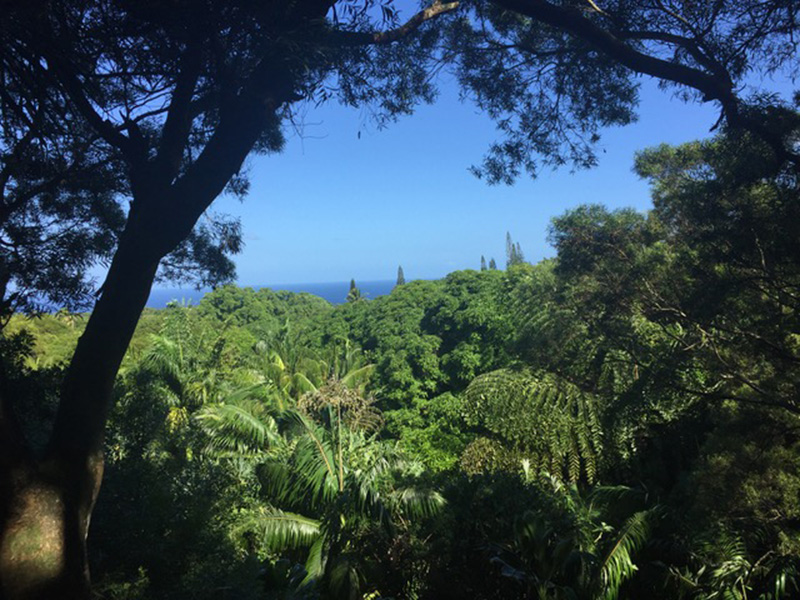There is no poet whose work has meant more to me than W. S. Merwin. Last December, I went to Hawaii for a series of conversations with Lewis Hyde, author of The Gift. The trip was organized by the Merwin Conservancy, an organization dedicated to the ongoing preservation of the poet’s writing, ideals, and now legacy. They also work on maintaining and preserving the palm garden in Maui that he built, along with his late wife, Paula. When you go there, it feels more like a forest, filled with palms of so many different varieties, many of them rare. It’s an unexpected, completely singular place. I hope it will survive and continue to thrive now that he is gone. I got to see Merwin, and sit and talk with him and his editor, Michael Wiegers, and Lewis, on the lanai overlooking the garden.
Toward the end of his life, Merwin lost his sight, though he was completely aware of what was going on around him. This is a note I wrote in my journal right after:
At one point there was a bird in a tree and I knew if I described it carefully enough he’d be able to tell us what it was, so I looked for a while and then said, what is that bird with the grey feathers and orange beak and a little bit of red in its tail and a crown, and he said, that’s a female cardinal, and I think she is about to have babies, so if we put a blueberry on the railing of the lanai her mate, the red cardinal, will come and get it. Merwin put two blueberries on the railing and the red cardinal came.
Long before the trip, I had begun a poem for him, but couldn’t seem to finish it. It was only after visiting the garden, and then sitting with him, that I was able to. Indeed, I finished it that same day, right after we sat together on the lanai. In the garden is Paula’s gravestone, where Merwin will also be buried. On it is the inscription “Here We Were Happy,” which, along with many other thoughts and things said during this trip, made its way into the poem.
Poem for Merwin
for a long time you planted one every day
and now the garden is a clock on forest time
forest time where we were happy
for a few translucent hours moving
into the ghost houses
no longer there
and the shade houses
that are
their myth of air
and the places where people used to gather
by the stream that is now a dry bed
to eat and sing
we cannot almost hear them
then out along the narrow paths
over stones I kept forgetting
like years you had placed
and the dead clock face painters
covered in radium could not convey
their messages to us
here in the permanent shade
the palms with their very different leaves
and seed pods seem to say
you who think nothing can be repaired
you who will not ever
be able to describe our shapes
and say I love to no one
or today I was born
you burned astronomers
look at our wet leaves
maybe you were not even born
for knowing your own planets
you were not born for knowing
but saying
a piece of wood burned next to the little jade statue
means no matter how many times we leave
we will keep returning
it means no matter how many times we go
out where they sell executions
we will come back here
where the black gravestone
is a window in love with the beloved
on it is written here we were happy
which is true
reading it I would like to remember
what I am feeling now
that I would like not to be
the mechanism
a blade angled in reason
I too would like to lay down
in my own sort of field
green with potential love
today I know I was born
to try to remember
the name of the simplest leaf
from the tree of my childhood
I have always known that god all along
and that we were each born
the shadow of reality upon us
so be not easily angry
pick up the small rose book
with its disappearing house on the cover
enter its doorway
get lost for a while
forget we were born to carry our names
until it is our turn with nothing to say
except maybe we were born to love
and move further on
Read some of our favorite W. S. Merwin poems in our archive.
Matthew Zapruder is the author, most recently, of Why Poetry (Ecco, 2017) and Father’s Day (Copper Canyon, fall 2019). He teaches at Saint Mary’s College of California and is editor at large at Wave Books.
from The Paris Review https://ift.tt/2UPqF3C

Comments
Post a Comment